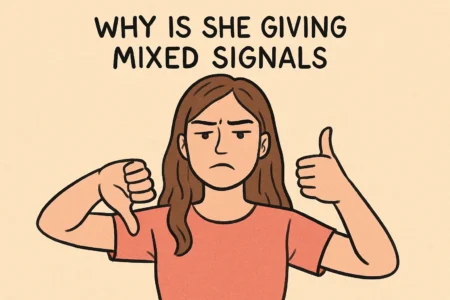Have you ever felt it? That strange, quiet distance between you and the person you love most. You’re both there, but something’s missing. You know you love them. And deep down, you’re pretty sure they love you, too. So why doesn’t it feel like the message is getting through? It’s like sending a love letter in a language they can’t read. If that feeling hits home, please know, you are not alone. I lived with that same quiet frustration for years, a feeling that we were doing everything right, but still drifting apart. It wasn’t until I discovered a simple, yet life-changing idea that everything finally clicked: the 5 love languages.
This single concept, from the work of Dr. Gary Chapman, was the key. It was a roadmap to connection that I didn’t even know I was searching for. It didn’t just change how I saw my husband; it changed how I understood love itself. Is it magic? No. But it’s the closest thing to a user’s manual for a real, lasting relationship I’ve ever found. This is how you bridge the gap between meaning well and feeling truly loved.
More in Relationship Health Category
Key Takeaways
- Love Can Get Lost in Translation: The big idea is that we all “hear” love differently. If you’re showing love one way and your partner needs to receive it another, the affection gets lost. It’s a simple translation error that can cause real distance.
- The Five Languages: At its core, it breaks down into five categories: Words of Affirmation, Acts of Service, Receiving Gifts, Quality Time, and Physical Touch. You likely have one that speaks to you louder than the rest.
- It’s Not About Reinventing Yourself: This isn’t about changing who you are. It’s about becoming bilingual in love. You get to be you, but you also learn to show love in a way your partner can actually feel.
- Knowing Your Own Language is Step One: You have to understand yourself first. How do you naturally show love? What do you ask for most? What hurts you the most when it’s missing? That’s your love language.
- Putting It Into Practice Is a Game-Changer: When you intentionally speak your partner’s language, you fill up what Dr. Chapman calls their “emotional love tank.” This single act can radically strengthen your connection.
Have You Ever Felt Like You and Your Partner Are Speaking Different Languages?
It happens all the time. You spend your entire Saturday washing and detailing your partner’s car, thinking this grand gesture is a clear declaration of your love. But later, they seem a little down, and mention they just wished you’d sat with them for a few minutes to have coffee. Or maybe you find the perfect, thoughtful gift, but they seem more thrilled by the hug you gave them when you handed it over. That’s the disconnect. It isn’t a failure of love.
It’s a translation problem.
Dr. Chapman’s idea of an emotional “love tank” is perfect here. When our partner speaks our primary love language, we feel secure, adored, and connected. Our tank is full. When they don’t, even if they’re showing love in other ways, the tank can run on fumes. In my early days with my husband, I was a praise machine. I told him how smart he was, how much I admired him, how great he looked.
I was speaking my own language—Words of Affirmation—and felt a little hurt when he wasn’t as verbally gushy in return. Meanwhile, he was always fixing things around the house for me, making sure my car was safe, and cooking dinner. He was showing his love through Acts of Service. We adored each other, but we were completely missing the signals.
So, What Exactly Are the 5 Love Languages?
Before we get into the nitty-gritty, let’s just put them on the table. Think of these as five unique channels for love. We can all appreciate a message from any channel, but one or two will always come in louder and clearer than the others. They’re our native tongue.
The five languages are:
- Words of Affirmation: Using words to build up your partner.
- Acts of Service: Believing that actions are what truly matter.
- Receiving Gifts: Feeling loved when you receive a thoughtful symbol of affection.
- Quality Time: Craving your partner’s complete, undivided attention.
- Physical Touch: Feeling most connected and loved through touch.
Getting a handle on these categories is the first step. The real change happens when you learn what they look like in your own messy, beautiful, day-to-day life.
Could Words of Affirmation Be Your Secret to Connection?
This language is all about what you say. For someone whose heart speaks this language, your words carry immense weight. They aren’t just sounds; they are powerful tools that can build a person up or tear them down. For them, kind words are like sunshine and water. They are essential. Unkind words, on the other hand, can feel like a physical blow.
What Does Speaking “Words of Affirmation” Actually Sound Like?
It’s about so much more than a routine “I love you.” It’s about being intentional. It’s about using your words to make your partner feel seen, appreciated, and secure. You can say them, write them, text them—the method doesn’t matter as much as the meaning. This is my native tongue, so I know this territory well.
Here’s what it can look like:
- Voicing Appreciation: “Thank you for making dinner. After the day I had, it means so much not to have to think about it.”
- Giving Compliments: “You were so impressive in that meeting today. You just radiated confidence.” Or even, “Wow. That color looks amazing on you.”
- Offering Encouragement: “I know this project is stressing you out, but I have total faith in you. You can do this.”
- Speaking Humbly: “I’m just so incredibly lucky that you’re my person.”
How Do You Know If This Is Your Partner’s Love Language?
Look for the little signs. Does a genuine compliment make their whole day? Do they seem to draw strength from your encouragement when they’re down? Often, these people are very verbally affirming to others. On the other side of the coin, harsh or critical words will wound them deeply. If a thoughtless jab from you can send them into a spiral, you can bet this is their language.
My Own “Aha!” Moment with Affirming Words
A few years back, I was leading a huge project at work that was way over my head. I was drowning in imposter syndrome, living in a constant state of low-grade panic. I was sure I was failing. Every single morning, my husband would find me getting ready, wrap his arms around me, and just say something simple. “You’re going to crush it today.
You’re the smartest person in that room.” He wasn’t trying to solve my problems. He was just offering his belief in me. Consistently. For me, that was more valuable than him doing every chore in the house. His words filled my tank. They gave me the courage to walk out the door. That’s when I felt it in my bones—the true power of this language.
Is It Possible That Actions Truly Speak Louder Than Words?
For some people, sweet words are nice, but they don’t mean much without action. If your partner’s main love language is Acts of Service, their philosophy is simple: “Don’t tell me you love me, show me.” These are the people who feel most cherished when their partner does things for them—thoughtful actions that make their lives easier and their burdens lighter.
What Do “Acts of Service” Look Like in a Real Relationship?
This is my husband’s language, so I’ve had years of on-the-job training. It’s crucial to understand this isn’t about being a servant. It’s about choosing to serve your partner because you love them. The feeling behind the action is everything. Doing something out of duty or with a resentful sigh sends the opposite message. It’s about seeing a need and choosing to meet it.
It’s the little things, like:
- Making their coffee in the morning without being asked.
- Warming up their car on a cold day.
- Tackling the chore you know they absolutely hate.
- Handling a stressful phone call or errand for them.
- Having dinner ready when they’ve had a brutal day.
How Can You Spot an “Acts of Service” Person?
The biggest clue is that this is how they show their own love. They’re the ones who make sure your favorite snack is always stocked, even if they aren’t big on compliments. And what sends them reeling? Laziness. Broken commitments. Feeling like their partner is making their life harder. When they’re overwhelmed and feel like they’re pulling the weight alone, their love tank empties fast. The sweetest words they can hear are not “I love you,” but “Don’t worry, I’ll take care of it.”
The Day a Clean Kitchen Felt Like a Love Sonnet
I remember one week from hell. I was on a crushing deadline, working past midnight every night, and our house just dissolved into chaos. Dishes towered, laundry cascaded, and I just felt this suffocating pressure from it all. I came home that Thursday, bracing myself for the mess, and walked into a pristine kitchen. The counters gleamed, the floors were washed, and something was simmering on the stove.
My husband, who was just as swamped as I was, had taken his afternoon to clean. I just started crying. Right there in the doorway. In that moment, his actions were more romantic than any poem. He saw that I was drowning and, without a word, threw me a life raft. For him, that was a love sonnet. And I finally heard it.
Does a Thoughtful Gift Mean More Than Its Price Tag?
This might be the most misunderstood language of them all. We’re so quick to label a love of gifts as materialistic. Shallow. But that completely misses the point. For a person who feels love this way, a gift is a tangible symbol. It’s physical proof that someone was thinking of them, that they matter.
Why Is “Receiving Gifts” So Misunderstood?
The secret is thoughtfulness. The price tag is almost always beside the point. A person who values gifts doesn’t want you to buy their affection. They want to know that you see them. The gift is a message. It says, “I was out in the world today, without you, and for a moment, I thought of you.” The magic is in that moment of connection. A single wildflower picked on a walk can scream “I love you” louder than an expensive, thoughtlessly chosen piece of jewelry.
How Do You Identify Someone Who Values Gifts?
These are the people who treasure things not for what they are, but for what they represent. They’ll hold onto a silly souvenir for years because of the memory attached to it. They also tend to be amazing gift-givers, putting incredible effort into finding that perfect something for others. On the other hand, a forgotten birthday or a last-minute, generic gift can be deeply painful. It’s not about the object. It’s about the message their heart hears: “I forgot about you.”
How an Old Book Became My Most Cherished Possession
A close friend of mine speaks this language fluently, and for years, I didn’t get it. Then one day, everything changed. I had mentioned, just once, an obscure, out-of-print children’s book I loved as a kid. Months later, for my birthday, she handed me a small, wrapped gift. It was the book. She had spent weeks hunting for it on secondhand sites. It couldn’t have cost more than a few dollars, but the effort, the fact that she remembered… it was overwhelming. I finally understood. The book wasn’t just a book. It was a tangible symbol of her love. It was proof that she listened.
Are You Craving Undivided Attention from Your Partner?
If you’ve ever thought, “Could you just put the phone down?” and felt a real pang of hurt, your love language is probably Quality Time. This isn’t about just being in the same room. It’s about being present. It’s about connection. For you, love is spelled T-I-M-E.
What Does “Quality Time” Genuinely Entail?
Quality Time is giving someone your focused, undivided attention. Turning off the TV. Putting the phone away. It’s about creating a little bubble for just the two of you. It’s sharing, listening, and truly seeing each other. This can be a deep conversation or simply doing something fun together, creating shared memories. As a study from Baylor University on “phubbing” (phone snubbing) confirms, this habit creates conflict and lowers relationship satisfaction for everyone, but for a Quality Time person, it’s devastating.
How Do You Recognize a “Quality Time” Person?
They are always trying to create moments to connect. They’ll suggest a walk, a game night, or just sitting and talking. They want to hear about your day—the real story, not just the highlights. What hurts them the most? Distractions. Canceled plans. Feeling like they’re competing with a screen for your attention. When you give them that focused time, their love tank overflows. When you don’t, they feel profoundly alone, even if you’re sitting right next to them.
Reconnecting When Life Got in the Way
There was a season in our marriage when we were just two ships passing in the night. Demanding jobs, family stress… we were exhausted. We were roommates, not partners. We’d sit on the couch, lost in our own phones, and the silence was deafening. I felt so lonely. Finally, we talked. We realized we were starving our relationship. So we made a simple rule: Wednesday nights, 8 PM, phones go in a drawer. No TV. At first, it was almost awkward. But slowly, it brought us back. Sometimes we’d talk for hours; other times, we’d just play cards. That simple, intentional time saved us.
Can a Simple Touch Convey More Than a Thousand Words?
The last language is maybe the most direct of all: Physical Touch. For someone who speaks this language, touch is their emotional lifeline. It’s not just a nice bonus; it’s essential. Without it, they feel disconnected and unloved. With it, they feel safe, secure, and home.
What Falls Under the Umbrella of “Physical Touch”?
Let’s be clear: this is about so much more than sex, though that is of course a vital part of it for many. The language of touch is spoken in hundreds of small, non-sexual ways throughout the day. It’s a language of presence and care.
It’s things like:
- Holding hands.
- A hug for no reason.
- A hand on the small of their back as you pass by.
- Sitting close on the couch, shoulders touching.
- A quick back rub.
- Playing with their hair.
Is Your Partner’s Love Language Physical Touch?
This one is usually pretty easy to spot. These are the touchy people. They reach for you, initiate hugs, and naturally gravitate closer. They just thrive on physical connection. A day without a hug can leave them feeling totally depleted. In a moment of crisis, a firm embrace is more powerful than any words could ever be. For them, physical presence is everything.
The Power of a Hug on a Really Bad Day
I’m not a big hugger by nature. I like my personal space. But I’ve learned to speak this language for the people in my life who need it. I remember one day that was just a train wreck from start to finish. I got chewed out at work, got a flat tire, and found out a project I loved was cut. I walked through the door ready to either scream or cry.
I didn’t want to talk about it. I didn’t want solutions. My husband just looked at me, opened his arms, and I fell into them. He just held me. He didn’t say a word. In that silent embrace, I felt the day’s tension just melt away. His touch said everything: I’m here. You’re safe. We’ve got this.
How Do You Figure Out Your Own Love Language (and Your Partner’s)?
By now, you likely have a good idea of what speaks to you. But if you’re still not sure, here are a few simple ways to find out.
Pay Attention to How You Express Love
What is your go-to method for showing you care? Are you always doing little things for people? That’s probably Acts of Service. Are you the one always sending that encouraging text? You might be a Words of Affirmation person. We tend to give love in the way we want to get it. It’s a massive clue.
Think About What Hurts the Most
Flip it around. What does your partner do or not do that just guts you? If a thoughtless gift makes you feel completely invisible, your language is likely Receiving Gifts. If their eyes are glued to their phone while you’re trying to talk, you’re probably a Quality Time person. The thing that hurts the most is usually the opposite of your love language.
Why Not Just Ask?
It sounds so simple, but we rarely do it. Have a real conversation about it. No pressure, no judgment. You could say, “I was reading this thing and it got me thinking… when do you feel the most loved by me?” Their answer will tell you everything. You could even take the official quiz online together. Make it a date. The goal isn’t to stick a label on each other. It’s to understand each other.
What Happens When You Start Speaking Their Language?
This is where everything changes. When you make a real, honest effort to speak your partner’s language, you’re sending a powerful message: “I love you enough to learn how to love you better.” It’s a profound gift. Their love tank starts to fill. They feel seen. Cherished.
It doesn’t mean you stop being you. I’ll always need to hear the words, and my husband will always feel loved when I take something off his plate. But now, I make it a point to help him with a project, and he makes it a point to tell me he’s proud of me. We stretch for each other. That stretching, that effort, is a language all its own. It replaces guesswork with gratitude.
This isn’t about grand gestures. It’s about small, consistent choices, day after day. It’s about learning to love your partner more effectively. This simple framework gives you the tools. All you have to do is start the conversation and build the kind of bond you both deserve.
FAQ – 5 Love Languages

How can I identify my own love language and that of my partner?
You can identify your love language by paying attention to how you naturally express love, what hurts you the most when missing, and what makes your partner feel loved. Asking your partner directly and observing their reactions can also provide helpful clues.
Is the concept of love languages about changing who I am?
No, it’s not about changing who you are. It’s about becoming bilingual in love, learning to show love in a way your partner can truly feel without losing your authentic self.
Can actions truly speak louder than words in expressing love?
Yes, especially for those whose love language is Acts of Service, where thoughtful actions can convey love more effectively than words alone, demonstrating care and commitment through actions.
What is the significance of physical touch in the love languages, and how can I tell if my partner speaks this language?
Physical Touch is about feeling loved and connected through touch, not just sex. If your partner frequently initiates hugs, holds hands, or seeks closeness, and feels depleted without touch, they likely speak this love language.





